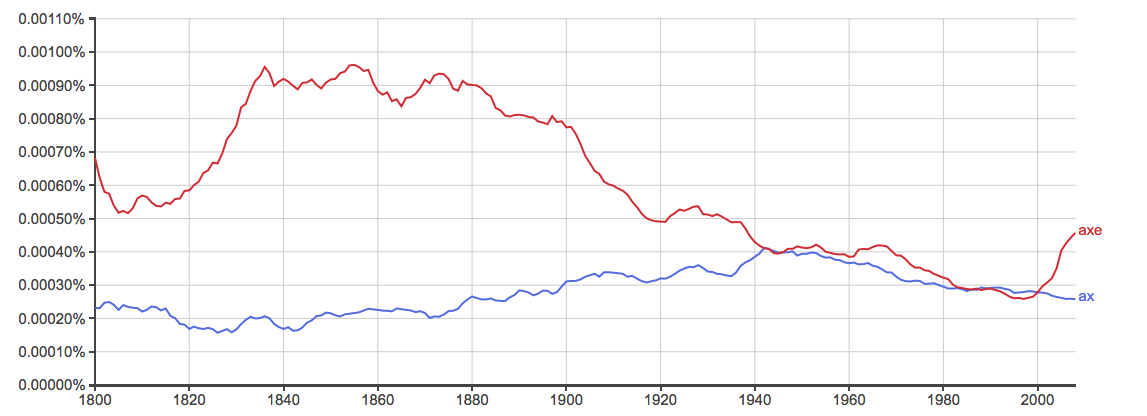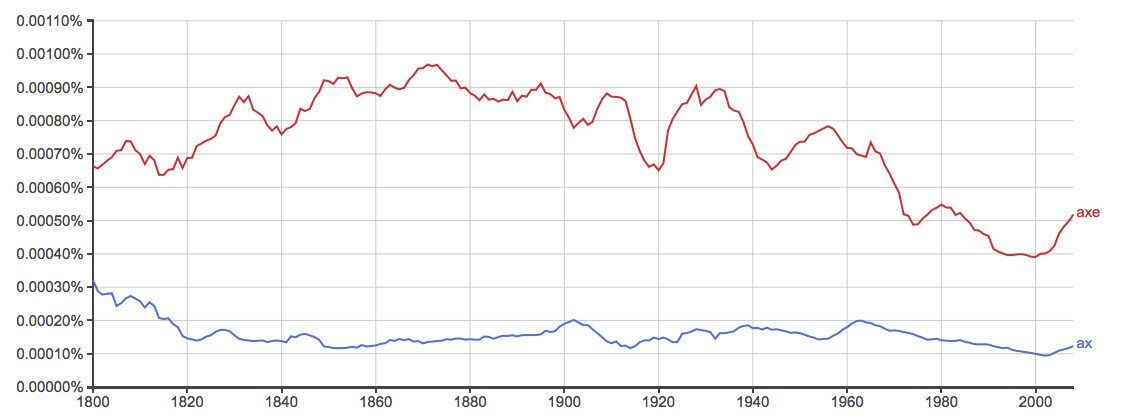Sometimes, words are spelled differently in British and American English, even if the words’ meanings don’t change. This can be confusing, but there is usually an easy way to remember.
Ax and axe are a good illustration of this principle. The two words mean the same thing and can be used in the same situations, but one is preferred in American English and the other is primarily used in British English. Read on to find out whether you should choose ax or axe in your writing.
What is the Difference Between Ax and Axe?
In this article, I will compare ax vs. axe. I’ll go over their uses, provide a sentence example of each, and I’ll also reveal a helpful trick for keeping these terms straight.
When to Use Ax
 What does ax mean? Ax and axe are different spellings of the same word. Each can be used as a noun or a verb.
What does ax mean? Ax and axe are different spellings of the same word. Each can be used as a noun or a verb.
As a noun, ax refers to a chopping tool with a long handle and a sharp, heavy head. Here are some examples ax as a noun:
- The woodcutter chopped down the tree with his ax.
- The mountaineer dug his ax into the ice to save himself from falling.
- That mascot Lumberjack wielded a purple wooden ax, wore suspenders and skinny Wranglers, and had a long red beard. The Lumberjack I’m talking about was a look-alike: Thomas Walkup, the Stephen F. Austin Lumberjacks’ star player. –The New York Times
As a verb, ax means to cut down, shorten, or otherwise remove something. It can be used in the traditional sense, e.g., to chop down a tree, but it is also used less literally. See the following examples:
- The school district voted to ax the arts budget.
- The board of directors needs to ax the CEO before the company can be successful again.
When to Use Axe
 What does axe mean? Axe is another spelling of the same word, and for several hundred years, it had been more common in both British and American English.
What does axe mean? Axe is another spelling of the same word, and for several hundred years, it had been more common in both British and American English.
In recent times, however, ax has gained in popularity among American English writers. The AP Stylebook, a popular American journalistic style guide, for instance, lists the word to be written as ax, not axe.
But, Garner’s Modern American Usage still lists axe as the more common of the two in American English and more common in English overall by a margin of 2:1, so the actual usage is unclear. There does appear to be a slight preference for ax in American English, while there is a strong preference for axe in British English.
For example, almost all British newspapers spell the word axe.
- After sacking Mr Cameron’s right-hand man George Osborne within hours of taking office on Wednesday, Mrs May has now taken the axe to Michael Gove, Oliver Letwin, Nicky Morgan and John Whittingdale. –The Telegraph


The above graphs show the usage of ax vs axe in American and British English books, respectively, written since 1800. The charts aren’t scientific or exact, but they are still useful for identifying a long-term trend.
As you can see, differences between ax vs. axe are much more pronounced in British English than in American English, where ax and axe are much closer.
It should be noted once again that axe can be used in all of the same contexts as ax. There is no difference between these words other than spelling.
Ax vs. Axe With Compound Words
When you are using compound words, what we have outline above holds true.
In British English, keep the extra “E.” For example, axe, pickaxe, poleaxe, broadaxe, etc.
In American English, drop the extra “E.” For example, ax, pickax, poleax, broadax, etc.
Trick to Remember the Difference
How to spell ax? Some sources say that axe is still more common in American English; others say that ax is now more common. In either case, both spellings are common to see in American writing, so neither is incorrect. There may be a slight preference for ax, but the important thing to do is to pick a spelling and stick with it in your writing.
On the English side, however, there is a clear preference for axe. Axe should be used if your writing will have a primarily British audience. You can remember to use this spelling by thinking of the extra “E” on the end as standing for England.
Other Uses of Axe
Axe, of course, is also a popular deodorant brand. This should always be spelled Axe because it is a proper noun. You should never see it written as Ax Deodorant.
Summary
Is it ax or axe? Ax and axe are variant spellings of the same word.
Ax/Axe can be a noun or a verb, and both spellings can be used in all the same contexts.
Axe has been the more common spelling for several centuries in British and American English, but in America ax has gained in popularity in recent times.
To summarize,
- Ax and Axe can be used in American English.
- Axe is the correct British English spelling.
Contents
